-
RESEARCH06-01-2015
Elderly families of South of Brazil in the Health Strategy
Revista Brasileira de Enfermagem. 2015;68(3):406-413
Abstract
RESEARCHElderly families of South of Brazil in the Health Strategy
Revista Brasileira de Enfermagem. 2015;68(3):406-413
DOI 10.1590/0034-7167.2015680305i
Views0See moreABSTRACT
Objective:
to characterize families and health status of the elderly in the Family Health Strategy and to verify the association of family composition with sociodemographic characteristics and health of the elderly.
Method:
population-based study with 215 families and 266 elderly, linked to the Family Health Strategy from a city of Rio Grande do Sul state.
Results:
there was predominance of nuclear family composition, considered as the main source of informal support, families of female elderly (62.6%) and cardiovascular complication. The nuclear structure was signifi cantly associated with female gender (PR = 0.77; p = 0.025) and smoking (PR = 1.35; p = 0.009).
Conclusion:
the results reinforce the need to maintain a network of formal and informal support to the elderly and their families to preserve the independence or to postpone the decline in functional capacity.
-
RESEARCH06-01-2015
From real to ideal – the health (un)care of long-lived elders
Revista Brasileira de Enfermagem. 2015;68(3):398-405
Abstract
RESEARCHFrom real to ideal – the health (un)care of long-lived elders
Revista Brasileira de Enfermagem. 2015;68(3):398-405
DOI 10.1590/0034-7167.2015680304i
Views0See moreABSTRACT
Objective:
to analyze similarities and dissimilarities in the meanings assigned to health care by long-lived elders and nursing professionals in a healthcare setting.
Method:
ethnographic qualitative research, based on the Spradley-McCurdy method and the interpretive anthropology of Geertz and Kleinman. The sample consisted of 20 key informants. Data were collected through participatory observation and ethnographic interviews from March to October 2013 and analyzed in domains, taxonomies and cultural themes.
Results:
Six domains and cultural taxonomies emerged and revealed reasons, attributes, and resources in providing care in relationship to long-lived elders and nursing professionals; fi nally, the following cultural theme emerged: the real to the ideal – the health (un)care of long-lived elders.
Conclusion:
The study showed the distance between the desired and actual health care provided to aged people in the scenario studied.
-
RESEARCH06-01-2015
Rescuing the pleasure of playing of child with cancer in a hospital setting
Revista Brasileira de Enfermagem. 2015;68(3):391-397
Abstract
RESEARCHRescuing the pleasure of playing of child with cancer in a hospital setting
Revista Brasileira de Enfermagem. 2015;68(3):391-397
DOI 10.1590/0034-7167.2015680303i
Views0See moreABSTRACT
Objective:
to dimension spaces and people that act on playing of children with cancer in outpatient treatment.
Method:
qualitative research developed with the creative sensitive method. A total of twenty two family members of seven children with cancer in outpatient treatment at a public hospital in Rio de Janeiro participated of this research. Data were generated in the family members’ homes, from September 2011 to May 2012.
Results:
after the diagnosis of childhood cancer, there was a change of scene and in the people who interact and play with children. Hospital has a central place for it, since children discover the pleasure of playing in this setting.
Conclusion:
the health care professional, especially nurses, who work on hospital care needs, should develop the ability of facilitate playing and therefore, enable care that promotes childhood development.
-
RESEARCH06-01-2015
Child Health Surveillance: nurses perspective
Revista Brasileira de Enfermagem. 2015;68(3):384-390
Abstract
RESEARCHChild Health Surveillance: nurses perspective
Revista Brasileira de Enfermagem. 2015;68(3):384-390
DOI 10.1590/0034-7167.2015680302i
Views0See moreABSTRACT
Objective:
to analyze conceptions of nurses on child health surveillance in family health units.
Method:
a qualitative study with thematic analysis of the data, based on the paradigm of Health Surveillance. Interviews were conducted with 13 nurses in a countryside city in the state of Sao Paulo.
Results:
nurses conceived child health surveillance as an active monitoring, which should be comprehensive, identifying risks/vulnerabilities, through multidisciplinary and intersectoral actions that are dependent on maternal involvement. We found partial development of these assumptions in practice, due to diffi culties such as lack of maternal involvement in the proposed actions, lack of time for discussion and adoption of measures in the units and disarticulation between levels and sectors of the city.
Conclusion:
a greater political and technical investment is needed to ensure the adoption of this model in different sectors and levels of care of the city.
-
EDITORIAL06-01-2015
The many sides of Research Integrity: For Integrity in Nursing!
Revista Brasileira de Enfermagem. 2015;68(3):375-377
Abstract
EDITORIALThe many sides of Research Integrity: For Integrity in Nursing!
Revista Brasileira de Enfermagem. 2015;68(3):375-377
DOI 10.1590/0034-7167.2015680301i
Views1We recently had the opportunity to participate in the 4th World Conference on Research Integrity in Rio de Janeiro. For us researchers, professors, authors, reviewers and scientific editors of nursing periodicals, the event was a watershed: From this point forward, we must step up our game and catch up with other areas that already discuss […]See more -
EDITORIAL06-01-2015
As diversas faces da Integridade em Pesquisa: por uma Enfermagem íntegra!
Revista Brasileira de Enfermagem. 2015;68(3):375-377
Abstract
EDITORIALAs diversas faces da Integridade em Pesquisa: por uma Enfermagem íntegra!
Revista Brasileira de Enfermagem. 2015;68(3):375-377
DOI 10.1590/0034-7167.2015680301i
Views0Recentemente, tivemos oportunidade de participar da 4ª Conferência Mundial de Integridade em Pesquisa, no Rio de Janeiro. Para nós, pesquisadores, docentes, autores, pareceristas e editores científicos de periódicos de Enfermagem foi um evento divisor de águas: de ora em diante precisamos apertar o passo para alcançar as áreas que já têm as questões de Integridade […]See more -
REFLECTION01-01-2015
Professional Master’s Degree: potential contribution to Advanced Practice Nursing
Revista Brasileira de Enfermagem. 2015;68(6):1186-1189
Abstract
REFLECTIONProfessional Master’s Degree: potential contribution to Advanced Practice Nursing
Revista Brasileira de Enfermagem. 2015;68(6):1186-1189
DOI 10.1590/0034-7167.2015680626i
Views0See moreABSTRACT
A reflection articleabout the contribution of Master’s Degree Programs in Advanced Practice Nursing and the Universal Health Coverage and the Universal Health Access, topicsthat have been discussed by the Pan American Health Organization, and which the Brazilian Nursingrequires not just appropriate, but further studyto reflect in order to define directions for our profession.
-
REVIEW01-01-2015
Concept of family insufficiency in the aged: critical literature analysis
Revista Brasileira de Enfermagem. 2015;68(6):1176-1185
Abstract
REVIEWConcept of family insufficiency in the aged: critical literature analysis
Revista Brasileira de Enfermagem. 2015;68(6):1176-1185
DOI 10.1590/0034-7167.2015680625i
Views0See moreABSTRACT
Objective:
to identify the attributes of the “family insufficiency” concept of the aged in the literature.
Method:
critical literature analysis.
Results:
family insufficiency is characterized as a complex process of psychosocial interaction, founded mainly on low social support of the aged and impaired family ties. Its antecedents are found in contemporary transformations within the family system, intergenerational conflicts, impaired family relationships and social vulnerability of the family. The consequences of family insufficiency include social vulnerability of the aged, decline of psychological and functional health, lower quality of life and unsuccessful aging. An original theoretical proposal was elaborated for the concept of family insufficiency in the elderly, with the identification of its attributes, antecedents and consequences.
Conclusion:
the findings of this study constitute a theoretical advancement in the Family Insufficiency Syndrome in elderly people and provide data for future field research in developing the concept.
-
RESEARCH01-01-2016
Nasal colonization with Staphylococcus aureus in nursing students: ground for monitoring
Revista Brasileira de Enfermagem. 2016;69(6):1046-1051
Abstract
RESEARCHNasal colonization with Staphylococcus aureus in nursing students: ground for monitoring
Revista Brasileira de Enfermagem. 2016;69(6):1046-1051
DOI 10.1590/0034-7167-2016-0210
Views0See moreABSTRACT
Objective:
to monitor bacterial strains of Staphylococcus aureus that are resistant or not to oxacillin in nursing undergraduate students, with an emphasis on the process of colonization.
Method:
cross-sectional prevalence study carried out with 138 nursing students. The biological samples of the nasal cavity were collected in June 2015, by means of sterile swabs, which were subsequently submitted to confirmatory tests of catalase and coagulase. Isolated Staphylococcus aureus had their sensitivity profile determined by means of the Kirby Bauer method. Descriptive, univariate and bivariate analyses were performed.
Results:
the prevalence of Staphylococcus aureus was 21.7. Regarding the resistance profile, 24.1% of strains were resistant to oxacillin, with ampicillin being the antimicrobial with the greatest resistance (82.8%).
Conclusion:
the nasal cavity is an important bacterial flora of S. aureus in nursing students. The profile of isolated strains highlights the increase of Staphylococcus aureus resistance to antimicrobials such as oxacillin.
-
RESEARCH01-01-2016
Factors associated with the occurrence of adverse events in critical elderly patients
Revista Brasileira de Enfermagem. 2016;69(6):1039-1045
Abstract
RESEARCHFactors associated with the occurrence of adverse events in critical elderly patients
Revista Brasileira de Enfermagem. 2016;69(6):1039-1045
DOI 10.1590/0034-7167-2016-0199
Views0See moreABSTRACT
Objective:
to identify the factors associated with the occurrence of adverse events in critical elderly patients admitted to intensive care unit according to demographic and clinical characteristics.
Method:
a retrospective cohort study was conducted in nine units of a teaching hospital. Data were collected from medical records and from monitoring of nursing shift change. We used the t-test/Mann-Whitney, chi-square and logistic regression to test associations. Significance level of 5% was used.
Results:
out of the 315 elderly, 94 experienced events. Those who experienced events were men (60.6%) with mean age of 70.7 years, length of hospital stay of 10.6 days and survivors (61.7%). Most of the 183 events were clinical processes and procedures (37.1%). There was an association between adverse event and length of hospital stay in the unit (p=0.000; OR=1.10, 95% CI [1.06, 1.14]).
Conclusion:
the identification of associated events and factors in the elderly subsidize the prevention of these occurrences before the vulnerability of this age group.
-
RESEARCH01-01-2016
Challenges to implementation of advance directives of will in hospital practice
Revista Brasileira de Enfermagem. 2016;69(6):1031-1038
Abstract
RESEARCHChallenges to implementation of advance directives of will in hospital practice
Revista Brasileira de Enfermagem. 2016;69(6):1031-1038
DOI 10.1590/0034-7167-2016-0085
Views0See moreABSTRACT
Objective:
to understand the difficulties and limitations in the implementation of advance directives of will in the hospital context.
Method:
qualitative, exploratory and descriptive study conducted by means of semi-structured interviews with nurses, resident physicians and family caregivers. The data were analyzed by using discursive textual analysis based on the framework of bioethics principles.
Results:
the following categories emerged: Terminality as an expression of loss and cure as an option for care; concerns about legal implications; advance directives of will demand patient autonomy and proper communication.
Conclusion:
limitations and difficulties in practice of advance directives of will from the perspective of the participants show, apart from countless conflicts and dilemmas regarding end-of life matters, that impending death experiences obstruct patients’ wishes.
-
RESEARCH01-01-2016
Experience and coping strategies in relatives of addicts
Revista Brasileira de Enfermagem. 2016;69(6):1024-1030
Abstract
RESEARCHExperience and coping strategies in relatives of addicts
Revista Brasileira de Enfermagem. 2016;69(6):1024-1030
DOI 10.1590/0034-7167-2015-0044
Views0See moreABSTRACT
Objective:
to understand the experience and coping strategies in relatives of drug addicts.
Method:
a study was developed with 87 relatives of addicts, registered in two Basic Health Units. The focus group was used as the study method, and content analysis was applied.
Results:
four categories were chosen: perception of relatives about the drug addiction of their family members; feelings and attitudes related to being a relative of an addict; difficulties found in the process; and, coping strategies. The findings reflected the difficulty when mentioning the subject, and the need of being cared for. Relatives believed that the addict needs to have the will to get into treatment, and they faced challenges in dealing with sporadic disappearances. They pointed to feelings of pity, impotence, disgust, hate, shame, fear of aggressiveness, and humiliation.
Conclusion:
the biggest difficulties were dealing with relapses, and the lack of public resources. Religiosity and faith, isolation and advice were used as coping strategies; ambivalence in thoughts and attitudes was demonstrated.
-
RESEARCH01-01-2016
Leadership and cooperation: 25 years of mission as a WHO collaborating center
Revista Brasileira de Enfermagem. 2016;69(6):1017-1023
Abstract
RESEARCHLeadership and cooperation: 25 years of mission as a WHO collaborating center
Revista Brasileira de Enfermagem. 2016;69(6):1017-1023
DOI 10.1590/0034-7167-2016-0058
Views0See moreABSTRACT
Objective:
analyse the evolution in the mission and vision of a World Health Organization Collaborating Centre in Nursing in Brazil in the context of the implementation of its terms of reference.
Method:
Historical-social documentary research with a qualitative approach.
Results:
During the 25 years of its activities as a Collaborating Centre, its mission to “promote and stimulate the development of nursing research in the region, with a focus on Latin America” triggered activities in the context of its terms of reference in four areas: Human Resource Formation for Research, Knowledge Production, Knowledge Dissemination, Encouragement of Exchange and Stimulus of Partnerships.
Conclusion:
The activities developed were consolidated through the strengthening of Brazilian and international partnerships, further stimulated by the five redesignations of the Collaborating Centre in the period analysed. Thus, its vision of becoming leader and driving agent of innovations in the academic, care and political context of nursing could be put in practice.
-
EDITORIAL01-01-2016
ABEn 90 years and the Brazilian Journal of Nursing
Revista Brasileira de Enfermagem. 2016;69(6):1011-1012
Abstract
EDITORIALABEn 90 years and the Brazilian Journal of Nursing
Revista Brasileira de Enfermagem. 2016;69(6):1011-1012
Views0In this special edition, we celebrate 90 years of the Brazilian Nursing Association (ABEn), at the same time in which we celebrate the creation and maintenance of the first scientific nursing journal in Brazil. Emerging in 1932, it has shone a light on the production of knowledge and the constitution of nursing in Brazil today.As […]See more -
EDITORIAL01-01-2016
ABEn 90 anos e a Revista Brasileira de Enfermagem
Revista Brasileira de Enfermagem. 2016;69(6):1011-1012
Abstract
EDITORIALABEn 90 anos e a Revista Brasileira de Enfermagem
Revista Brasileira de Enfermagem. 2016;69(6):1011-1012
Views0Neste número temático, celebramos os 90 anos da Associação Brasileira de Enfermagem (ABEn), ao mesmo tempo em que comemoramos a criação e manutenção da primeira revista científica de enfermagem do Brasil, que, desde 1932, despontou trazendo luz para a produção do conhecimento e a constituição do que é a enfermagem no Brasil atual.A ABEn, como […]See more -
ERRATUM01-01-2016
ERRATUM
Revista Brasileira de Enfermagem. 2016;69(5):1003-1003
Abstract
ERRATUMERRATUM
Revista Brasileira de Enfermagem. 2016;69(5):1003-1003
DOI 10.1590/0034-7167.20166905e02
Views1Article “Association between self-care and hospital readmissions of patients with heart failure”, with number of DOI: 10.1590/0034-7167.2016690312i, published in the journal Revista Brasileira de Enfermagem, v69(3):469-74, page 469 that read:“Amanda Chlalup LinnI, Karina AzollinII,III, Emiliane Nogueira de SouzaII,IV“.[…]See more
-
ORIGINAL ARTICLE07-29-2024
Evidence of validity of the Risk Self-Medication Questionnaire focused on Health Literacy
Revista Brasileira de Enfermagem. 2024;77(3):e20230386
Abstract
ORIGINAL ARTICLEEvidence of validity of the Risk Self-Medication Questionnaire focused on Health Literacy
Revista Brasileira de Enfermagem. 2024;77(3):e20230386
DOI 10.1590/0034-7167-2023-0386
Views0See moreABSTRACT
Objectives:
to analyze the validity evidence of the internal structure of the Risk Self-Medication Questionnaire Focused on Health Literacy.
Methods:
a psychometric study with 499 adults. The internal structure was assessed with exploratory and confirmatory factor analysis to prove the adjustment. Internal consistency was measured by composite reliability and McDonald’s omega coefficient (ω).
Results:
the parameters revealed a model of 35 items distributed across four factors, explaining 56% of the total variance, with factor loadings ranging from 0.31 to 0.85 and adequate communalities. Accuracy (0.79
Conclusions:
an instrument was obtained with good evidence of structural validity for measuring self-medication.
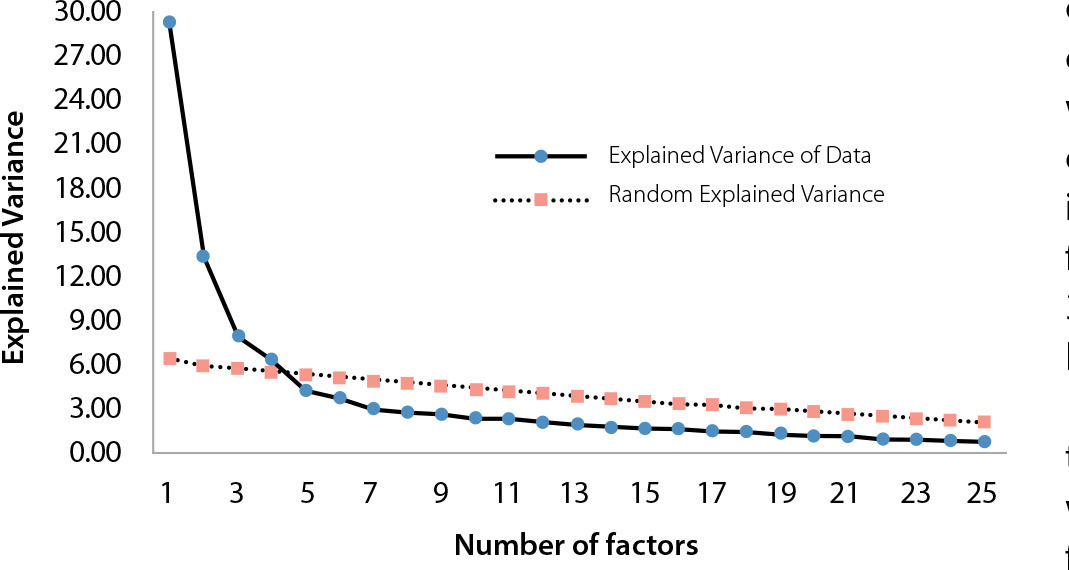
-
ORIGINAL ARTICLE07-29-2024
Nurses’ perspectives on nurses’ work methods
Revista Brasileira de Enfermagem. 2024;77(3):e20230374
Abstract
ORIGINAL ARTICLENurses’ perspectives on nurses’ work methods
Revista Brasileira de Enfermagem. 2024;77(3):e20230374
DOI 10.1590/0034-7167-2023-0374
Views0See moreABSTRACT
Objectives:
To analyze nurses’ perspectives on nurses’ work methods in the hospital context.
Methods:
A descriptive study with a qualitative approach was conducted in a hospital in northern Portugal, involving 17 nurses. Semi-structured interviews were used for data collection. Data collected between May and June 2023 underwent content analysis, supported by Atlas.ti software.
Results:
Three thematic areas emerged: “Nurses’ work methods in a hospital context,” highlighting the conception and components of work methods and the methods in use; “Implementation of nurses’ work methods,” emphasizing influencing factors and challenges to implementation; and “Impact of nurses’ work methods on patients, nurses, and institutions.”
Final Considerations:
Nurses’ work methods constitute the structure of nursing care. Some factors influence and some challenges arise in the implementation of these methods, producing impacts on patients, nurses, and institutions.

-
ORIGINAL ARTICLE07-29-2024
Nursing Process for institutionalized older adults: contributions from knowledge awareness workshop
Revista Brasileira de Enfermagem. 2024;77(3):e20230349
Abstract
ORIGINAL ARTICLENursing Process for institutionalized older adults: contributions from knowledge awareness workshop
Revista Brasileira de Enfermagem. 2024;77(3):e20230349
DOI 10.1590/0034-7167-2023-0349
Views0See moreABSTRACT
Objective:
To analyze the knowledge of professionals working in a Nursing Home about the Nursing Process before and after the awareness workshop.
Methods:
This is strategic action research, developed with nursing professionals and managers of a Nursing Home in Rio Grande do Sul, Brazil. Data were collected between January and June 2023, through semi-structured interviews before and after an awareness workshop. Discursive textual analysis of the data was carried out.
Results:
The central category “Understanding about the Nursing Process in Nursing Homes” emerged, which was unitized into two units of meaning and three categories of analysis.
Conclusion:
Data revealed non-use and lack of knowledge of the Nursing Process before awareness raising. Afterwards, a deeper understanding of the topic and its importance was identified. Awareness-raising workshops contribute to transformation of knowledge.
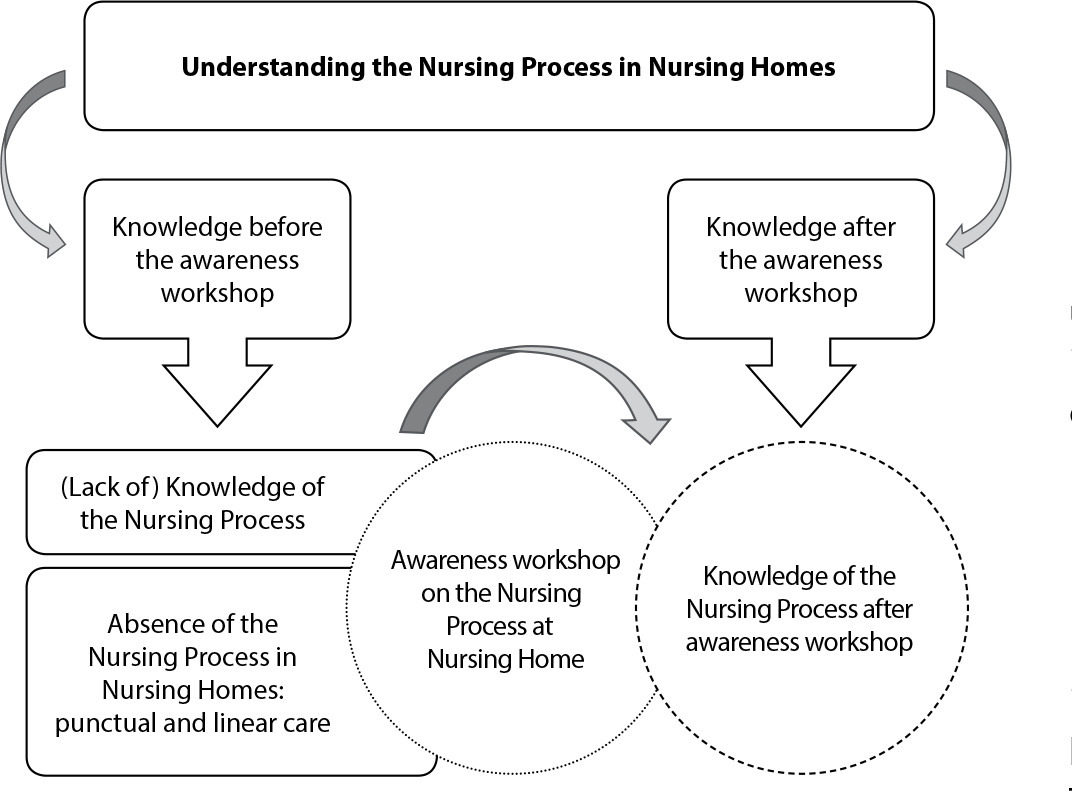
-
ORIGINAL ARTICLE07-29-2024
Excessive daytime sleepiness in nursing technicians: association with sleep quality and memory
Revista Brasileira de Enfermagem. 2024;77(3):e20230332
Abstract
ORIGINAL ARTICLEExcessive daytime sleepiness in nursing technicians: association with sleep quality and memory
Revista Brasileira de Enfermagem. 2024;77(3):e20230332
DOI 10.1590/0034-7167-2023-0332
Views0See moreABSTRACT
Objective:
to investigate excessive daytime sleepiness prevalence among nursing technicians and the association with sleep quality and memory.
Methods:
a cross-sectional, inferential study, carried out in a hospital unit in the state of Goiás between December 2020 and January 2021. Assessments were carried out using the Epworth Sleepiness Scale, the Pittsburgh Sleep Quality Index and the Prospective and Retrospective Memory Questionnaire, instruments validated for the Brazilian context. Bivariate and multivariate logistic regression analyzes were performed.
Results:
the sample consisted of 189 nursing technicians with a 40.9% excessive daytime sleepiness prevalence. In multivariate models, excessive daytime sleepiness was not associated with sleep quality, however there was a significant association with overall memory failures.
Conclusions:
study results demonstrate a high excessive daytime sleepiness occurrence, an association with overall memory failures and the need for psychosocial interventions for nursing technicians.
-
ORIGINAL ARTICLE07-29-2024
Educational technology for multidisciplinary training for managing waiting lists for elective patients
Revista Brasileira de Enfermagem. 2024;77(3):e20230299
Abstract
ORIGINAL ARTICLEEducational technology for multidisciplinary training for managing waiting lists for elective patients
Revista Brasileira de Enfermagem. 2024;77(3):e20230299
DOI 10.1590/0034-7167-2023-0299
Views1See moreABSTRACT
Objectives:
to construct and assess an educational technology for managing patient waiting lists for multidisciplinary training.
Methods:
study supported by Instructional Design – ADDIE model, whose stages of construction of educational technology were developed in the form of a multi-professional training course. Its respective content assessment was carried out by a committee of experts from 2021 to 2022. The analysis occurred based on the proportion of content adequacy with 95% Confidence Interval.
Results:
seventeen products were created as educational technology learning objects: five storyboards; four videos; three comic books; two pedagogical action plans; a mind map; and a YouTube® playlist. Nine experts assessed content adequacy, which reached 0.89.
Conclusions:
this educational technology contributes to the performance of professionals who manage waiting lists by reducing inequalities, alleviating differences, in addition to promoting equity in care and good health for patients in the Brazilian Health System.

-
ORIGINAL ARTICLE07-29-2024
Fuzzy Logic: vulnerability of women who have sex with women to sexually transmitted infections
Revista Brasileira de Enfermagem. 2024;77(3):e20230271
Abstract
ORIGINAL ARTICLEFuzzy Logic: vulnerability of women who have sex with women to sexually transmitted infections
Revista Brasileira de Enfermagem. 2024;77(3):e20230271
DOI 10.1590/0034-7167-2023-0271
Views0ABSTRACT
Objective:
To describe the possibility of applying Fuzzy Logic in analyzing the vulnerability of Women Who Have Sex with Women to Sexually Transmitted Infections/HIV/AIDS.
Methods:
We developed a Fuzzy Logic system with 17 input variables and one output variable, using data related to vulnerability in a municipality located in the Midwest region of the State of São Paulo, Brazil.
Results:
The factor with the greatest positive impact was the confirmation that a low understanding of Sexually Transmitted Infections/HIV/AIDS is associated with higher vulnerability. Conversely, the statement “Not disclosing sexual activity to healthcare professionals,” where individuals do not admit to having sex with women, had the least impact.
Conclusions:
Fuzzy Logic facilitates the identification of vulnerability, expressed through the analysis of interaction between variables in each dimension. This makes it a promising method to assist in analyzing the vulnerability of specific populations.
Keywords:Fuzzy LogicHealth VulnerabilityReproductive HealthSexually Transmitted DiseasesWomen Who Have Sex With WomenSee more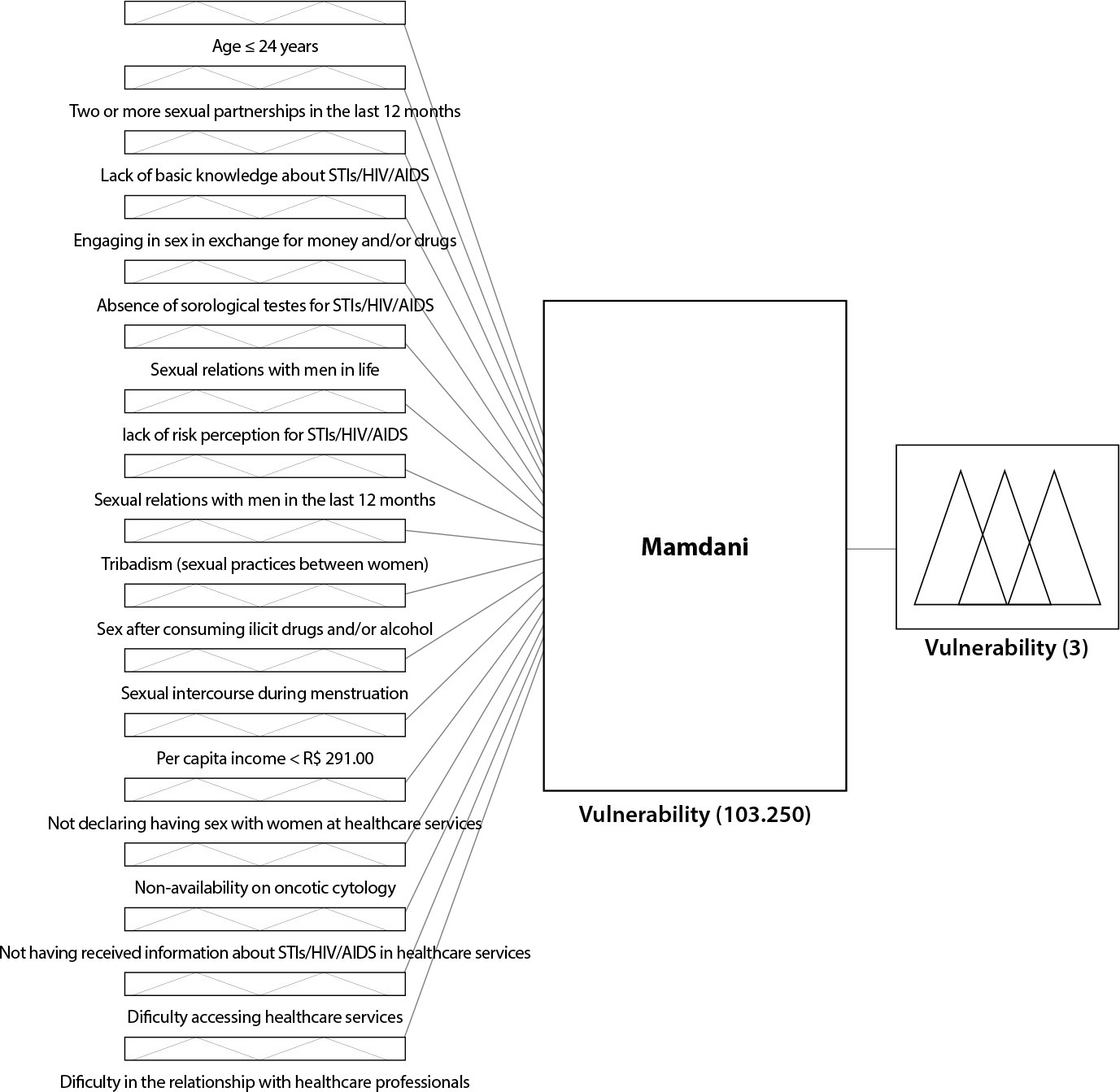
-
ORIGINAL ARTICLE07-29-2024
University Student Depression Inventory, Brazilian Version, Construct Assessment
Revista Brasileira de Enfermagem. 2024;77(3):e20230232
Abstract
ORIGINAL ARTICLEUniversity Student Depression Inventory, Brazilian Version, Construct Assessment
Revista Brasileira de Enfermagem. 2024;77(3):e20230232
DOI 10.1590/0034-7167-2023-0232
Views0See moreABSTRACT
Objectives:
to assess the University Student Depression Inventory, Brazilian version (USDI-BR), construct.
Methods:
a methodological study carried out with a snowball probabilistic sample, consisting of 334 undergraduate and graduate students. Confirmatory factor analysis, reliability using McDonald’s omega coefficient and Cronbach’s alpha were performed. Principal component analysis was performed using the varimax rotation and oblimin rotation, using the Kaiser-Meyer-Olkin criteria, Bartlett’s test of sphericity and scree plot.
Results:
the USDI-BR presented an internal consistency of items of ω = 0.95 and remained with 30 items, with the addition of 1 factor (Death wish and social withdrawal), totaling 4 factors.
Conclusions:
the USDI-BR has evidence that points to its validity and also its internal consistency, deserving that new studies be carried out to expand the evidence of its psychometric properties.
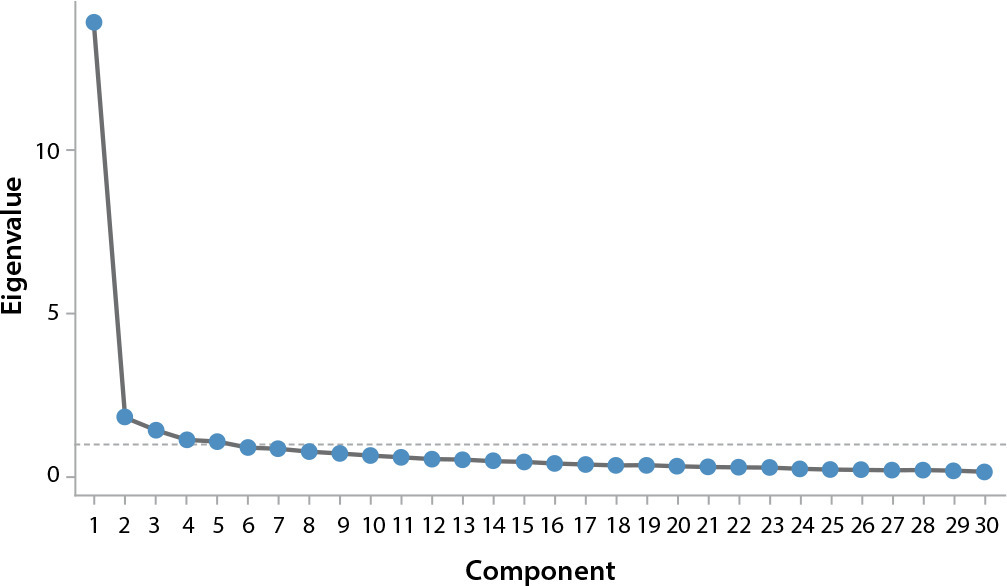
-
ORIGINAL ARTICLE07-29-2024
Family refusal of skin donation for transplantation: trends and associated factors
Revista Brasileira de Enfermagem. 2024;77(3):e20230209
Abstract
ORIGINAL ARTICLEFamily refusal of skin donation for transplantation: trends and associated factors
Revista Brasileira de Enfermagem. 2024;77(3):e20230209
DOI 10.1590/0034-7167-2023-0209
Views0See moreABSTRACT
Objectives:
to analyze the trends and factors associated with family refusal of skin donation for transplantation.
Methods:
this cross-sectional study was conducted in the State of São Paulo, with family authorization terms collected from 2001 to 2020. The variables analyzed included year, age, gender, cause of death, and type of institution. Data were analyzed using linear and multiple logistic regression, with the Odds Ratio estimated at p<0.05 for statistical significance.
Results:
1,355 individuals refused skin donation. The trend of refusals decreased between 2001 and 2009 in the age groups of 0-11 years and 12-19 years, but increased in the group aged ≥60 years. This trend continued to decrease in the 0-11 years group from 2010 to 2020, and increased in the 20-40 years group. Males and the age groups of 20-40 years, 41-59 years, and ≥60 years exhibited 27%, 34%, 47%, and 53% lower chances of refusal, respectively.
Conclusions:
there is an urgent need for measures to mitigate the high number of refusals associated with skin donation.
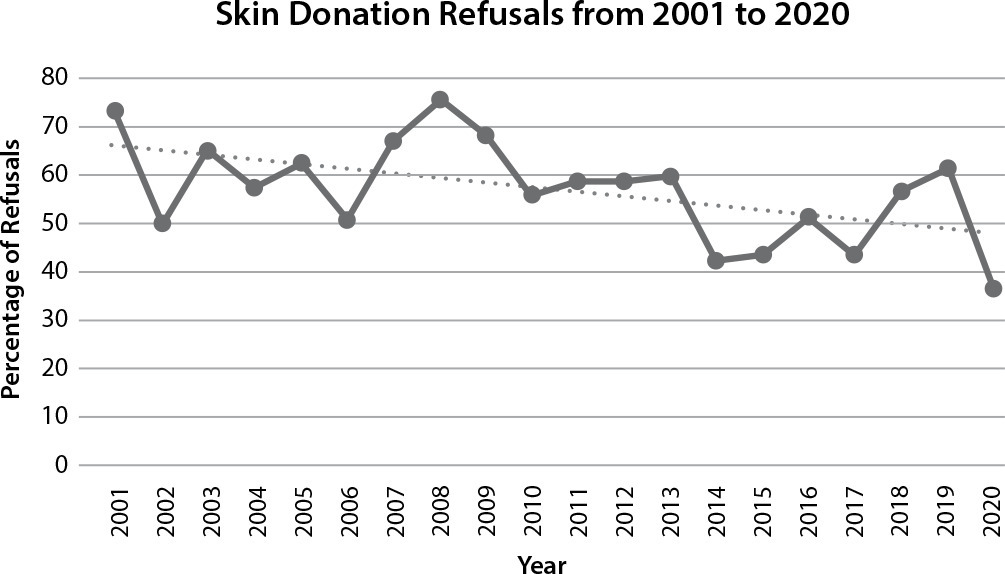
Search
Search in:
Nuvem de Tags
Aged (144) Atenção Primária à Saúde (239) COVID-19 (104) Cuidados de Enfermagem (269) Educação em Enfermagem (151) Educação em Saúde (139) Enfermagem (930) Estudos de Validação (131) Health Education (144) Idoso (208) Mental Health (149) Nursing (987) Nursing Care (306) Patient Safety (151) Primary Health Care (284) Qualidade de Vida (104) Quality of Life (106) Saúde Mental (145) Segurança do Paciente (150) Validation Studies (108)



